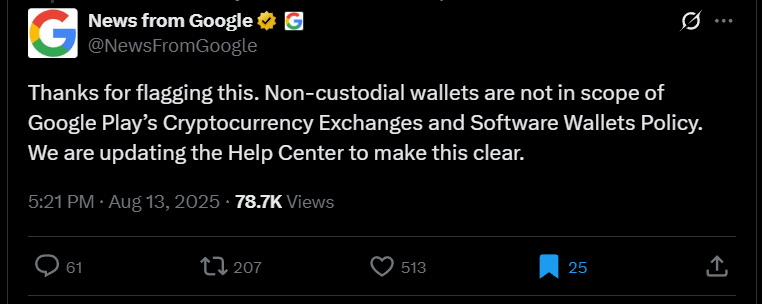In an unusual move, Google owned up to accidentally banning all non-custodial crypto wallets from the Google Play Store and promised to revise its new policy to clarify that non-custodial wallets on the platform don’t need to be government-licensed banks or registered money services businesses (MSBs).

(Google clarified that non-custodial wallets are “not in scope” of their new policy which many thought was meant to ban such wallets from the platform.)
The Google Play Store had quietly updated its policy on July 10, 2025. But it wasn’t prepared for the backlash generated by an article from The Rage published on Wednesday, revealing a wrinkle in the new policy that would have required all crypto wallets in the Google Play Store across 15 jurisdictions to have government licensing and registration.
“Thanks for flagging this,” Google wrote in a response on X. “Non-custodial wallets are not in scope of Google Play’s Cryptocurrency Exchanges and Software Wallets Policy. We are updating the Help Center to make this clear.”
Custodial wallets store cryptocurrency on behalf of their customers. This is commonly done by exchanges and similar entities that must register with the U.S. Financial Crimes Enforcement Network (FinCen) as MSBs. But some customers prefer to have full ownership and control of their assets, so they instead use non-custodial wallets that allow users to store private cryptographic keys on their devices. Because of this fundamental distinction, FinCen does not consider non-custodial wallets to be MSBs, let alone banks.
Yet the new Google Play Store policy, until today, made no such distinction, requiring all “cryptocurrency exchanges and software wallets” in 15 listed jurisdictions including the U.S., the UK, the EU, and Canada, to be licensed or registered by government regulators, a move that would have eliminated many or all non-custodial crypto wallets from the platform.
“If your app is targeting any of the countries/regions listed below, you will be served location-specific forms to complete,” the policy reads. “If you don’t have the required registration or licensing information for certain locations, remove them from your app’s targeting countries/regions.”
The language infuriated crypto legal experts and privacy gurus, with some describing it as “regulation by monopoly,” “insane,” and “a quiet coup on crypto.” The uproar was enough to get Google’s attention, and fortunately, the tech powerhouse promised to revise the new policy, promptly putting the controversy to rest.
免责声明:本文章仅代表作者个人观点,不代表本平台的立场和观点。本文章仅供信息分享,不构成对任何人的任何投资建议。用户与作者之间的任何争议,与本平台无关。如网页中刊载的文章或图片涉及侵权,请提供相关的权利证明和身份证明发送邮件到support@aicoin.com,本平台相关工作人员将会进行核查。




